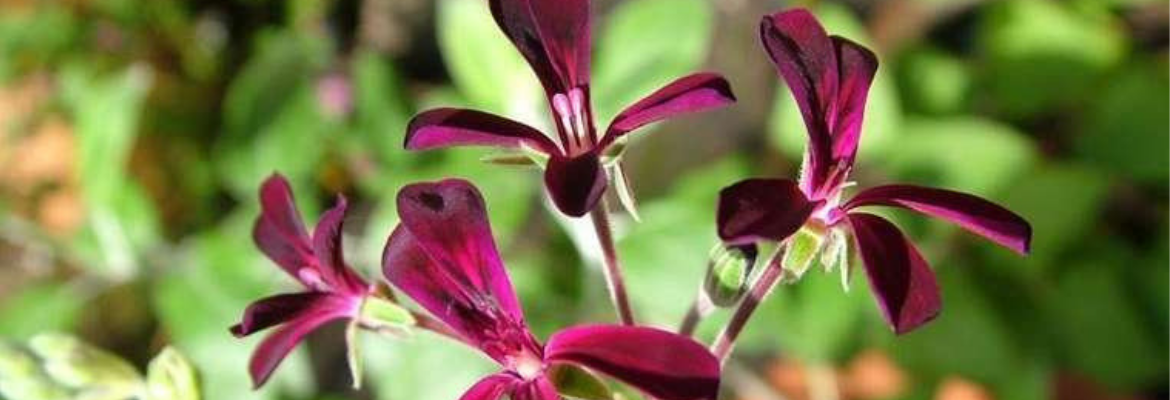
History and uses of Umckaloabo, South Africa's amazing herb!
The history and medicinal benefits of South Africa's native Umckaloabo (Pelargonium sidoides)
In light of the overuse of antibiotics which are (for the most part) prescribed unnecessarily by many health practitioners, as well as the need for natural remedies for chest and respiratory problems,we would like to introduce a wonderful medicinal and indigenous plant called Umckaloabo (Pelargonium sidoides). This wonderful medicinal herb can be used to treat various ailments, and potentially help reduce the overuse of antibiotics and antibiotic-resistant diseases.
What is Umckaloabo
Umckaloabo is the root of a South African geranium, Pelargonium sidoides. Pelargonium sidoides should not be confused with Pelargonium graveolens (rose geranium) which is commonly used to make essential oils for aromatherapy, flavorings, and perfume.
Other names of Umckaloabo: African Geranium, EPs 7630, Geranien, Geranio Sudafricano, Geranium, Géranium d'Afrique, Géranium d'Afrique du Sud, Géranium du Cap, Geranium Root, Ikhubalo, Icwayiba, i-Yeza lezikali, Kalwerbossi, Khoaara e Nyenyane, Pelargonien, Pelargonio Sudafricano, Pelargonium Root, Pélargonium d'Afrique, Pélargonium du Cap, Pelargonium sidoides, Rabas, Rabassam, Racine de Géranium, Racine de Pélargonium, South African Geranium, Uvendle.
The interesting history of Umckaloabo
Although Umckaloabo has been used for generations by the indigenous people of South Africa, it was only introduced to the western world in the late 1800s to early 1900s. A 17 year old young man by the name of Charles Henry Stevens emigrated to South Africa in the late 1800s. After being diagnosed with tuberculosis, he turned to a traditional healer who treated him with various natural indigenous remedies, one of them being Umckaloabo. Seeing the wonderful results, Charles Stevens developed a remedy (named Stevens' Cure) containing Umckaloabo which he sold in South Africa.
After returning to England, he took his remedy with him and attempted to promote this wonderful natural cure. The medical press and the British Pharmacopoeia were not impressed by Stevens' product, as they felt that their patented drugs were being threatened by this wonderful natural 'cure', AKA Umckaloabo.
As much as they tried to discredit him, Stevens, being passionate about his natural remedy, fought back against the British press and British Pharmacopoeia, and fought to prove that all of their allegations were incorrect. Court cases ensued where questions were asked in parliament and accusations made, but, despite medical and political opposition, Stevens’ Cure remained available until the early 1950s.
Adrien Sechehaye, a doctor from Geneva concluded that, while not infallible, the ingredient (Umckaloabo) was a definite advance in the treatment of tuberculosis. Research was done in Germany and Umckaloabo was registered as a medicinal herb. To this day, Umckaloabo remains a popular herbal remedy in parts of Europe.
So why do we never hear about this powerful medicinal remedy in South Africa? Well, Umckaloabo fell out of favor when antibiotics were developed in the 1900s. While certain people who believed in holistic and plant-based healing continued to use Umckaloabo and other medicinal herbs, the majority of people simply accepted every prescribed antibiotic course their doctor issued. This overuse of antibiotics has resulted in antibiotic-resistant diseases (superbugs), depressed immune systems, digestive imbalances and other secondary medical conditions.
The medicinal benefits of Umckaloabo
Umckaloabo has been shown to have significant antibacterial properties against multi-resistant Staphylococcus aureus strains, and is believed to have antimicrobial and immunostimulatory effects. Below is a list of the various medicinal benefits of Umckaloabo:
- Treatment of tuberculosis
- Treatment of acute respiratory tract infections (i.e. bronchitis, sinusitis, tonsillitis, the common cold etc.)
- Sore throat and swollen tonsils (tonsillopharyngitis) - Umckaloabo extract has been shown to significantly reduce pain and difficulty swallowing after 4 days of treatment
- Increase the body's normal response to infection
- It is also said to help with herpes, gonorrhea, diarrhea, and dysentery
Side effects of Umckaloabo
If taken as indicated, there should be no side effects of Umckaloabo. However, people with certain conditions may need to use Umckaloabo with caution or under medical supervision:
- People on prescription anticoagulants: Umckaloabo contains a substance known as coumarin that acts as an anticoagulant (blood thinner). Taking Umckaloabo while on anticoagulants can lead to excessive bleeding. For the same reason, you should stop taking Umckaloabo at least 2 weeks prior to any surgery or dental procedure.
- Those who have autoimmune diseases: Umckaloabo should be used with caution by people who have autoimmune diseases (lupus, psoriasis, rheumatoid arthritis, autoimmune hepatitis etc.). Umckaloabo may activate the antibodies which in turn could trigger autoimmune symptoms.
- Pregnant/breastfeeding mothers: Herbal remedies are usually not recommended for children, pregnant women or nursing mothers.
How to use Umckaloabo
Umckaloabo is only intended for short-term use or until symptoms disappear. It is usually taken orally in tincture form, and sometimes taken in tablet form, too.
If you would like to enjoy the wonderful benefits of this South African medicinal herb, we can highly recommend Inala Health Umckaloabo!
If you have any question, please contact us or leave a comment below for FREE health advice. We always love hearing from you!






Leave a comment